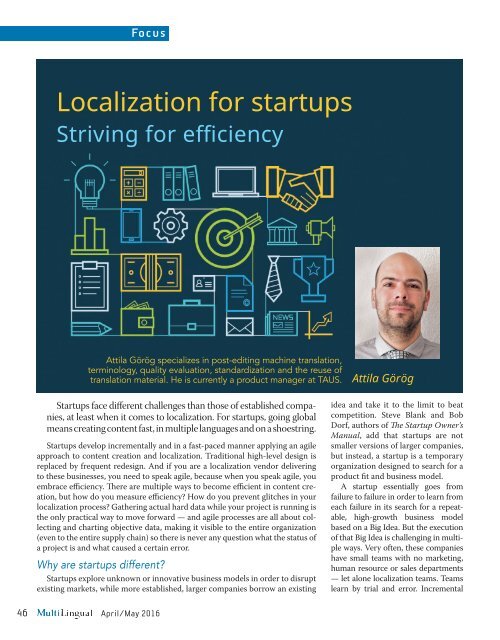Localization
z99kl79
z99kl79
You also want an ePaper? Increase the reach of your titles
YUMPU automatically turns print PDFs into web optimized ePapers that Google loves.
Focus<br />
<strong>Localization</strong> for startups<br />
Striving for efficiency<br />
Attila Görög specializes in post-editing machine translation,<br />
terminology, quality evaluation, standardization and the reuse of<br />
translation material. He is currently a product manager at TAUS.<br />
Attila Görög<br />
Startups face different challenges than those of established companies,<br />
at least when it comes to localization. For startups, going global<br />
means creating content fast, in multiple languages and on a shoestring.<br />
Startups develop incrementally and in a fast-paced manner applying an agile<br />
approach to content creation and localization. Traditional high-level design is<br />
replaced by frequent redesign. And if you are a localization vendor delivering<br />
to these businesses, you need to speak agile, because when you speak agile, you<br />
embrace efficiency. There are multiple ways to become efficient in content creation,<br />
but how do you measure efficiency? How do you prevent glitches in your<br />
localization process? Gathering actual hard data while your project is running is<br />
the only practical way to move forward — and agile processes are all about collecting<br />
and charting objective data, making it visible to the entire organization<br />
(even to the entire supply chain) so there is never any question what the status of<br />
a project is and what caused a certain error.<br />
Why are startups different?<br />
Startups explore unknown or innovative business models in order to disrupt<br />
existing markets, while more established, larger companies borrow an existing<br />
idea and take it to the limit to beat<br />
competition. Steve Blank and Bob<br />
Dorf, authors of The Startup Owner’s<br />
Manual, add that startups are not<br />
smaller versions of larger companies,<br />
but instead, a startup is a temporary<br />
organization designed to search for a<br />
product fit and business model.<br />
A startup essentially goes from<br />
failure to failure in order to learn from<br />
each failure in its search for a repeatable,<br />
high-growth business model<br />
based on a Big Idea. But the execution<br />
of that Big Idea is challenging in multiple<br />
ways. Very often, these companies<br />
have small teams with no marketing,<br />
human resource or sales departments<br />
— let alone localization teams. Teams<br />
learn by trial and error. Incremental<br />
46 April/May 2016


